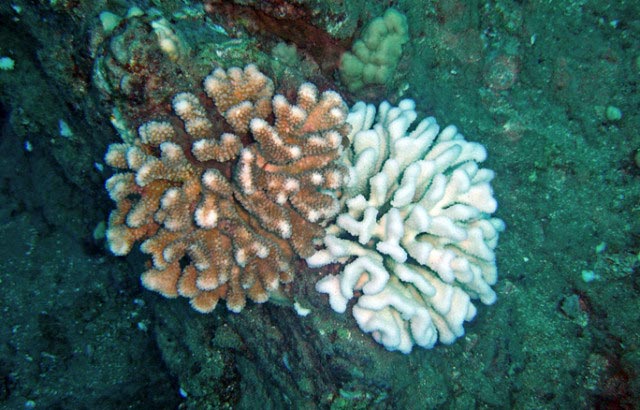|
By Claire Bekker, '21
Researchers at the University of Miami Rosenstiel School of Marine and Atmospheric Science scoured the genome of a common species of coral, Pocillopora damicornis (known as the cauliflower coral), to understand its evolutionary history and adaptive strategies to environmental change. [3] They compared its gene sequence to other coral genomes (Cnidaria, Anthozoa, Scleractinia), species in the same class as corals such as sea anemones, and more distantly related groups like sea sponges. They looked for orthologs between P. damicornis and other groups: genes in different species that are descended from the same ancestral sequence and indicate common ancestry. 46.6% of P. damicornis genes had orthologs in other scleractinians (hard, stony corals). These highly related gene sequences comprise a ‘core’ coral genome of basic cellular and metabolic functions. Of the ‘core’ genes, 3.7% were found only in scleractinians, not in the other corals (Cnidaria and Anthozoa) or more distantly related groups, and thus, they provide a genetic basis for the corals’ close evolutionary relationship.
Even more exciting, the functionality of these genes suggests that corals share a common immune system. 32 of the coral-specific genes were very similar to known immune receptors and likely compose coral-specific immune pathways. While corals share this unique immune system, it is not identical in each species—different species have different forms of immune genes. Thus, species’ immune systems have evolved adaptively for different functions, such as maintaining the mutually beneficial relationship between coral and the algae that inhabit them, lowering their susceptibility to disease, and responding to environmental stress. Due to their innate immunity, hard corals, especially P. damicornis, have been successful in many different environments and can adapt to environmental change. They may even stand a chance against climate change. After all, climate-induced challenges to coral reef systems (bleaching and disease) affect the immune system. With their adaptive immune systems, hard corals, such as P. damicornis, may be more resilient than we expected. But this doesn’t mean that their survival is guaranteed. And it certainly doesn’t diminish our obligation to prevent future climate change. This study can help us better understand how corals deal with stress and why hard corals have more adaptive tools to deal with climate change than other coral species. It can also inform current conservation efforts: species without a complex immune system are more at risk for extinction and should be the focus of more concerted action. As politicians and companies alike continue to ignore how climate change is affecting human societies, these corals offer a valuable lesson in adaptation and resilience to us all. References: 1. World Wildlife Foundation [11 November 2018] Available from: http://wwf.panda.org/our_work/oceans/coasts/coral_reefs/ 2. Slezak, M. The Guardian [11 November 2018] https://www.theguardian.com/environment/2016/jun/07/the-great-barrier-reef-a-catastrophe-laid-bare 3. Cunning, R., Bay, R.A., Gillette, P., Baker A.C., Traylor-Knowles, N. Comparative analysis of the Pocillopora damicornis genome highlights role of immune system in coral evolution. Scientific Reports, 2018; 8 (1) DOI: 10.1038/s41598-018-34459-8
0 Comments
Leave a Reply. |

